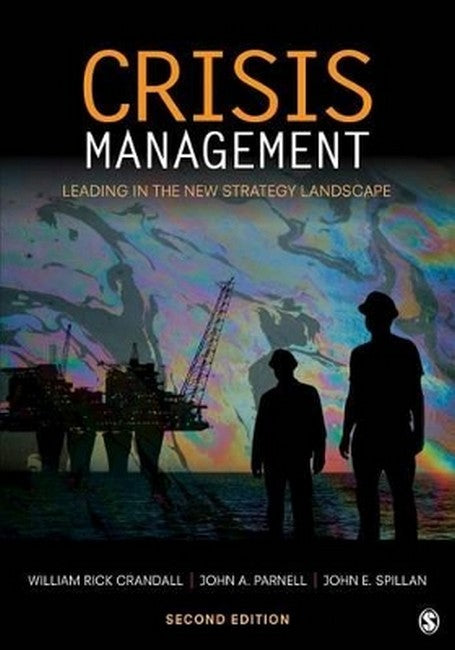William "Rick" Crandall (PhD, University of Memphis) is professor of Management at the University of North Carolina at Pembroke. Previously, Dr Crandall taught for eleven years at Concord College, Athens, where he served on the college's crisis management team. Dr Crandall's articles on crisis management have appeared in a wide range of journals. John A. Parnell (PhD, University of Memphis, EdD, Campbell University; MAEd, East Carolina University) is the William Henry Belk Distinguished Professor of Management at the University of North Carolina at Pembroke, where he was recipient of the 2005 Adolph Dial Award for Scholarly and Creative Activity. John E. Spillan (PhD, Warsaw School of Economics) is professor of Business Administration at the University of North Carolina at Pembroke. His research interests center on crisis management, international marketing, entrepreneurship, and international business. His articles have appeared in a wide range of journals.
Request Academic Copy
Please copy the ISBN for submitting review copy form
Description
Preface 1. A Framework for Crisis Management 2. The Crisis Management Landscape 3. Sources of Organizational Crises 4. A Strategic Approach to Crisis Management 5. Forming the Crisis Management Team and Writing the Plan 6. Organizational Strategy and Crises 7. Crisis Management: Taking Action When Disaster Hits 8. Crisis Communication 9. The Importance of Organizational Learning 10. The Underlying Role of Ethics in Crisis Management 11. Emerging Trends in Crisis Management Appendix. Sample Outline of Items to Include in the Crisis Management Plan Index About the Authors
"I really like [Crisis Management]. It is very readable and interesting. It is able to explain things clearly without being too basic for the more experienced reader...There is more 'content' and more different approaches and perspectives than in other crisis management books. Other books seem repetitive, dry and one-note by comparison." -- Stephen C. Betts "I LOVE the basic premise: that crisis management should be integrated with strategic management. That beautifully underlies the authors' preferred framework, which in turn drives the text's organization and content. Too often, courses and texts are developed in silos, with strategic management being separated from organization theory and organization behavior and so on...This text takes an interdisciplinary approach to a set of critical problems that managers must consider and resolve in order to protect the interests of their employees, organizations, and communities." -- Lucy A. Arendt "I think the level of writing and presentation is excellent." -- Karen M. Leonard "The book was easy for [my students] to read and understand. It also provided good mini cases...The exercises and mini cases were very useful. However, the overall readability for students is what I found impressive and why I chose this book over others in the market." -- Tami Moser "Overall, I found the Crandall, Parnell and Spillan book appropriate in scope (not overly broad and general, but also not clearly narrow and specific). They focused in on essential information for an introductory book on crisis management, and the reader should be well informed just by reading this book. The writing style was straightforward, concise and business-like, with a professional conversational tone. I liked it, and found it easy to read this book and to stay engaged with the material. I think students will find it interesting, comprehensible, and appealing to read." -- Marcia J. Kurzynski Lock Haven "This book offers a logical and theoretical framework for crisis management, depicted in a visual model that is explained with real-world examples. The book expertly blends theory with real-world application in a manner that simply makes sense. Such an approach is extremely valuable when planning for crises as well as teaching how to plan for crises...The chapters then have a very real-world approach so the amount of theory is perfect!" -- Dana Moore Gray "Excellent! That's why I have selected it as my text. The incorporation of strategy emphasizes the importance of crisis planning. It covers most of what I have traditionally emphasized in my courses. I particularly like its structure, breaking the process into stages and internal and external landscape. The text also covers the entire process of crisis management from sources and early warning to recovery...It covers the sequential unfolding of crises and as such, matches the way I teach and consult on CM. Very nicely done!" -- David X. Swenson

